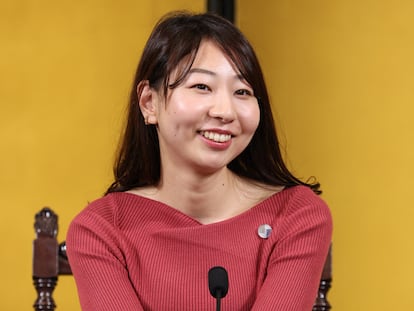Author who won Japan’s top literary award with help from ChatGPT: ‘AI helps you compensate for your weaknesses’
Rie Kudan said that only ‘one page’ of the 144 that make up the story was generated with artificial intelligence, in a passage where the main character has a conversation with an AI system

Rie Kudan, the Japanese writer who won this year’s Akutagawa Prize — the highest award in Japanese literature — with a book where around 5% of the content was generated by ChatGPT, encourages writers to use generative artificial intelligence in their creations.
“If you think carefully about how to use it and face your own weaknesses, AI helps you compensate for them,” says the 33-year-old author, speaking at the headquarters of her publishing house, Shinchosha, which advertises her work under the slogan “A book of prophecies in the era of generative artificial intelligence.” However, Kudan says that the input from AI was very small: “Only one page out of 144.”
The novel Tokyo To Dojo To (Tokyo’s Tower of Sympathy) was described by the jury as an “almost flawless” work and earned Kudan a literary prize created in 1935 and which has launched the careers of authors such as Kenzaburo Oe, winner of the Nobel Prize for Literature in 1994. The award winner was announced in January.
What has since then become the most famous conversation with a machine in Japanese literature takes place when the main character in the novel, an architect who has been asked to design an elegant high-rise prison in the center of Tokyo, asks an artificial intelligence system called AI-built to explain the reason for applying the Latin term homo miserabilis to criminals.
Dissatisfied with the condescending tone of the response, she asks the system if it is aware of its inability to read, to which the AI, designed to generate text-based information, responds no, adding that illiterate is a pejorative term that can be discriminatory. “I wanted to show a reflection on the essence of language,” says Kudan.
The statement that 5% of the book was generated with AI produced “a certain nervousness” among the editors, says its author, underscoring her surprise with the global media headlines. On Amazon’s sales website, one reader described the inclusion of AI dialogues as “refreshing,” while another complained that style takes precedence over story and recommended it “for an entrance exam to a Japanese university.”
Kudan, who declares herself a fan of Pedro Almodóvar’s films and a follower of the Japanese author Yukio Mishima, suggests that like The Temple of the Golden Pavilion (1956), her work can be read as a book about architecture. She said she will continue to use generative artificial intelligence in her creations because “it is a technology that can expand your potential.” The author added that Japanese regulation regarding the use of AI is still “very ambiguous.”
Artificial intelligence in Japan is widespread at the corporate level, according to a recent survey by the public broadcaster NHK. Of 100 large Japanese companies, 86 confirmed that they use it to create or summarize documents, or in combination with their own systems in advanced applications.
After the European Parliament achieved the majority support of its members for what will be the world’s first comprehensive law to regulate artificial intelligence, the ruling Liberal Democratic Party of Japan (LDP) announced that it will propose a new law with similar objectives this year.
Many Japanese companies are guided by regulations from the Japan Deep Learning Association (JDLA), an academic group founded in 2017 to promote the use of new generative technologies in the industry and address demographic contraction.
Its regulations govern a prestigious science fiction literary competition that bears the name of the famous author Shinichi Hoshi (1926-1997), and which according to its website accepts works generated by artificial intelligence as long as they are subsequently edited by a human being. Another requirement is to let the jury know what prompt was used, in order to clarify the interests and original intention of the creator.
Sign up for our weekly newsletter to get more English-language news coverage from EL PAÍS USA Edition
Tu suscripción se está usando en otro dispositivo
¿Quieres añadir otro usuario a tu suscripción?
Si continúas leyendo en este dispositivo, no se podrá leer en el otro.
FlechaTu suscripción se está usando en otro dispositivo y solo puedes acceder a EL PAÍS desde un dispositivo a la vez.
Si quieres compartir tu cuenta, cambia tu suscripción a la modalidad Premium, así podrás añadir otro usuario. Cada uno accederá con su propia cuenta de email, lo que os permitirá personalizar vuestra experiencia en EL PAÍS.
¿Tienes una suscripción de empresa? Accede aquí para contratar más cuentas.
En el caso de no saber quién está usando tu cuenta, te recomendamos cambiar tu contraseña aquí.
Si decides continuar compartiendo tu cuenta, este mensaje se mostrará en tu dispositivo y en el de la otra persona que está usando tu cuenta de forma indefinida, afectando a tu experiencia de lectura. Puedes consultar aquí los términos y condiciones de la suscripción digital.









































